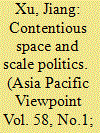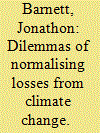|
|
|
Sort Order |
|
|
|
Items / Page
|
|
|
|
|
|
|
| Srl | Item |
| 1 |
ID:
152526


|
|
|
|
|
| Summary/Abstract |
Over the past three decades, we have seen a flourishing of scholarship which explores the emerging political spaces and variegated scales of governance in China. This research draws on political economic tradition to argue that the way in which cities and regions are governed is indeed infused with socio-political struggles which are proliferating at a range of spatial scales. Such theoretical interpretation is illuminating, but it has been subject to increasing criticism from the poststructuralist approach that views scale as an epistemological construct. This paper uses the Pearl River Delta Intercity Railway System (PRD-ICRS) as a case study to challenge the onesidedness of both the political economy tradition and the poststructuralist approach in reading scale. It employs the “scale politics” thesis to argue that scale is more than a material existence (or institutionalised structure) that represents a particular arrangement of political power, being subject to perpetual transformation through regulatory projects and strategies. It is also a “representation trope” deployed in political discourses to acquire persuasive power to frame and legitimise these projects and strategies. Scale is thus both material and discursive. Understanding the two moments of scale enables a fuller dissection of political transformation.
|
|
|
|
|
|
|
|
|
|
|
|
|
|
|
|
| 2 |
ID:
152528


|
|
|
|
|
| Summary/Abstract |
While ‘solutions’ to challenges of water supply in the Pacific may seem obvious to hydrologists, engineers and planners, their implementation may not be straightforward. Water is embedded in cultural, religious and political contexts, and what seems obvious to planners may seem neither obvious, nor acceptable, to citizens. However, these contexts change continuously, and opportunities arise for changes in narratives around ownership, supply and management of water. Citizens' beliefs about the state's ‘rights’ will vary with societal context, and will shape the ways in which ownership and management of water is worked out in specific locations. This paper outlines thinking and discourses around ownership and management of fresh water in Samoa, and the constraints which culture has imposed on water supply over time. Water discourses have shifted from questions about ownership of specific sources to general discussions about conservation and management of natural resources. This shift has resulted, in part, from the ways in which government has managed the process and, in part, from growing public awareness of water within the larger environmental context. The paper focuses on Samoan material, but some of the generic issues have wider significance in the Pacific because similar variables combine in similar ways.
|
|
|
|
|
|
|
|
|
|
|
|
|
|
|
|
| 3 |
ID:
152522


|
|
|
|
|
| Summary/Abstract |
The idea that climate change may cause the loss of atoll countries is now taken for granted in much of climate change science, policy and media coverage. This normalisation of loss means atoll countries now face a future that is apparently finite, which is a grievous situation no other country has to contend with. This paper explains the dilemmas this presents to atoll countries. If there is a risk of forced migration, then strategic planning can minimise its social impacts. Yet, doing so may bring future dangers into the present by undermining efforts to facilitate adaptation to climate change, creating new identities and deterring investments in sustainable resource management. To overcome this dilemma, the paper argues for a more hopeful approach to the future of atoll countries, because for as long as the science of loss remains uncertain, and the limits to adaptation are unknown, forced migration cannot be taken as a matter of fact and could possibly be averted through emission reductions and a vastly improved and significantly more creative approach to adaptation.
|
|
|
|
|
|
|
|
|
|
|
|
|
|
|
|
| 4 |
ID:
152523


|
|
|
|
|
| Summary/Abstract |
Most resettlement in the Pacific, whether for political, economic or environmental reasons, has been in some respects unsuccessful, often resulting in land disputes, social conflicts, marginalisation, impoverishment and return migration. Resettlement after volcanic eruption poses particular problems because of necessary immediacy, temporal uncertainty over the duration of the displacement and the wish of most of those displaced to return, when possible. The eruption of the Manam Island volcano in 2004–2005 displaced over 9000 people to the nearby mainland. Successful resettlement, one of the largest necessitated in the Pacific region, has proved difficult, resulting in land disputes, violence, disease and inertia, as a consequence of 10 years of government inability to achieve a permanent resettlement plan or enact a plan. Despite formal opposition, and intermittent volcanicity, many Manams have chosen to return to the island. The Manam Islanders' experience provides a warning about the complex challenges inherent in population resettlement in only subtly different cultural, geographical and political contexts.
|
|
|
|
|
|
|
|
|
|
|
|
|
|
|
|
| 5 |
ID:
152530


|
|
|
|
|
| Summary/Abstract |
Over recent decades, the demand for bottled water has grown exponentially at the global scale. In the marketing of such products, discourses of purity and paradise have often been invoked. Marketed as a ‘Taste of Paradise’, FIJI Water has gained enormous international success as an ostensibly clean and green product. Celebrity endorsements – reaching as high as US President Barack Obama – have abounded, driven in part by the belief that the corporation is both environmentally and socially responsible. This paper describes and analyses the rise of FIJI water and critically assesses the sources and impacts of its economic success. It goes on to explore its local social and environmental impacts in the context of a country that has been subject to waves of democratic crises where the fate of the polity has been influenced by FIJI Water's actions. FIJI Water has come to assume the role of development trustee in the villages most affected by the growth in exports. The democratic crises in Fiji has given FIJI Water profound developmental influence, and this has brought both costs and benefits at the local socio-environmental scale.
|
|
|
|
|
|
|
|
|
|
|
|
|
|
|
|
| 6 |
ID:
152529


|
|
|
|
|
| Summary/Abstract |
This article is a discussion of the “discourse on the unthinkable” surrounding potential future democratic engagements with rivers as non-human persons or natural objects. In the context of the Asia–Pacific region, this article suggests that the developments in material philosophy entitled “new materialism” are essential tools in the reconceptualisation of rivers as democratic entities but that local socio-historical conditions must also be taken into the account. In order to make its case, the article not only surveys the context for considering rivers as non-human persons in a juridical context but also discusses the new material context that assists modern democracies in the renegotiation of the demos that forms the body politic of democracy – often in the face of neoliberal exploitation and a legacy of extremes in instrumentalism. The article argues that the incorporation of water in the democratic project of enfranchisement is an essential exercise born of many Western beliefs and ideals but articulated uniquely at a regional and national level.
|
|
|
|
|
|
|
|
|
|
|
|
|
|
|
|
| 7 |
ID:
152524


|
|
|
|
|
| Summary/Abstract |
This paper examines intra-household and socio-cultural factors leading to differential outcomes in educational attainment by gender and birth order amongst smallholder oil palm households in Papua New Guinea. Not all children share equitably in the household resources allocated to education: females have lower average education levels than males, and high birth order children have higher education attainment than lower birth order siblings, indicating preferential parental investment in sons and early born children. The findings demonstrate that despite households having regular access to relatively high incomes from oil palm and residing in close proximity to schools, primary school net enrolment rates remain significantly lower than those for East Asia and the Pacific region, and the millennium development goal of universal primary education has not been met. This finding is likely to be the result of a combination of intra-household factors including gender power imbalances, low parental education levels, the agency of youth in educational decision-making and the weakening attraction of education as a means of improving income-earning potential.
|
|
|
|
|
|
|
|
|
|
|
|
|
|
|
|
| 8 |
ID:
152525


|
|
|
|
|
| Summary/Abstract |
Through an examination of two festivals – Qing Ming and Cap Go Meh – in the town of Singkawang in Indonesian Borneo (Kalimantan), we show how Singkawang-bound Chinese Indonesian tourists and their Singkawang-based relatives produce a diasporic heritage network through ‘moorings’ generated by both transnational and internal migration. Instead of returning to a singular ‘homeland’ in distant China, these tourists return to Chinese-majority Singkawang as a result of their personal genealogical roots and of their broader cultural allegiance with a kind of Chinese-ness that Singkawang has come to represent within a post-Suharto Indonesia. Through these two festivals, we demonstrate how personal heritage practices like ‘roots tourism’ and visiting friends and relatives are intimately bound up with identity and developmental politics at local, national and international scales. In so doing, we identify a range of ways in which migratory and tourism flows by Chinese Indonesian internal migrants shape relations to their ancestral hometowns and cultural ‘homelands’ in Indonesia within the context of membership to and participation in a broader transnational diaspora.
|
|
|
|
|
|
|
|
|
|
|
|
|
|
|
|
| 9 |
ID:
152527


|
|
|
|
|
| Summary/Abstract |
In the past two decades spaces for user participation have been opened within water governance structures at many scales. In this contribution, based on a case study of the Provincial Water Users Federation Interjuntas-Chimborazo in the Ecuadorian Highlands, I explore how and why formal participation of water users in itself is problematic in terms of democracy. The case shows that for organised peasant water users to work on more democratic water governance, the creation of upscaled federations, alliances, networks and sometimes street protests is crucial to open up spaces in which their interests are represented. This suggests that democracy is not merely about participation, but more importantly, it is about the politics of how democracy is made through conflicts, protests, negotiations and the creation of strategic alliances that challenge the structures and processes through which decisions are taken.
|
|
|
|
|
|
|
|
|
|
|
|
|
|
|
|
|
|
|
|
|